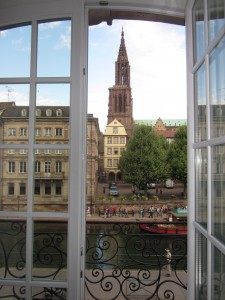 On July 1st I started on a new job with the Council of Europe. There will be time to share just what I am doing here. The point I am trying to make at present is that I have become a migrant again (I spent a couple of years in London in the 90s), joining the growing host of my fellow Italians who decide to pursue their own development abroad. I’m renting an apartment in Strasbourg, on Quai des Bateliers: from my windows I see the cathedral, on the other side of the river.
On July 1st I started on a new job with the Council of Europe. There will be time to share just what I am doing here. The point I am trying to make at present is that I have become a migrant again (I spent a couple of years in London in the 90s), joining the growing host of my fellow Italians who decide to pursue their own development abroad. I’m renting an apartment in Strasbourg, on Quai des Bateliers: from my windows I see the cathedral, on the other side of the river.
Hanging out on the Italian side of blogs and social networks I got the idea that many Italians, when they move abroad, slam the door on their way out. I had a sort of tag cloud in my head, where expressions like “stagnating country”, “incompetent ruling class”, “talent is not recognized”, “innovation-averse” hang fluctuating, in large colored letters. But when I thought better about it, actually none of the Italians working abroad I know (and there are many) use these expressions. Sometimes I have noticed a hint of bitter irony in comparing their trajectories in London or Berlin with those of their previous lives in Cosenza or Sassuolo, but it is of course not really fair to compare London with Sassuolo. There are a few world cities, and qualified migrants tend to end up there. Italy has no city of this class, as is true of most European countries. The expressions of this particular tag cloud, I now think, are mostly used by people who have not left Italy, and who feel, right or wrong, underrecognized.
I certainly don’t feel that way. I have no reason to think my talents, if any, have not been recognized in my own country. I moved out firstly because my intellectual development brings me to seek closer interaction with smart people all over the world, and secondly because I am an European patriot; I think Italy makes sense in the context of Europe, and that Europe would be mutilated without Italy, the astounding traction of its civil society, its ability to make things happen without delegating everything to a nanny State, yet staying away from extreme individualism. Now that I have left Italy, I hope I can be even more useful and more present to my countrymen. I work in an international institution as an Italian, and I want to be an open channel between my country, my continent and the world.